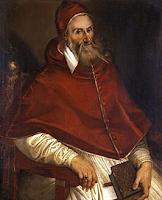Today is the first of May, or that's what Shakespeare thought, as did all proper Englishmen. May, for him, ran from May 11th to June 10th.
The reason for this is reasonably simple.
Ancient folk noticed that there were 365 days in a year. This allowed for calendars etc. Life was simple.
Then Ancient Romans noticed that this wasn't quite right. In fact, there were 365 and a quarter days in a year. That's how long it takes for the earth to go round the sun once.
So Julius Caesar decreed that everyone should have a new calendar with an extra day every four years. This is pretty familiar stuff: it's February 29th, a leap year.
Because the calendar was decreed by Julius, it got called the Julian Calendar. Life was simple again for a millennium and a half.
Then Renaissance Italians noticed that, in fact, a year was 365 and just less than a quarter days. This upset them terribly.
The reason they were so terribly upset was that religious festivals. Christmas is meant to happen on the exact anniversary of Christ's birth. The same went Epiphany and Assumption and Annunciation, not to mention all the Saints' Days. Th dating of Easter was also terribly complicated, but terribly important.
The Renaissance Italians realised that they had been celebrating everything on the Wrong Day. That's because the day-calendar had been slipping out of sync with the solar-calendar. Not by much, mind you. Only by one day every century and a half. But as this had been going on for a millennium and a half, it meant that everything was wrong by ten days.
So Pope Gregory decreed a new calendar where a leap day is missed out every century or so. And he also decreed that we had to get everything back to it's proper anniversary. So on October the 4th 1582, he announced that tomorrow would be October the 15th.
Thus all of Catholic Europe moved forward ten days, and called the new system the Gregorian Calendar.
But England was Protestant, and we were very suspicious. We decided that all this looked very like a dastardly Catholic plot and that we weren't going to fall for it, and Brexit meant Brexit, and we were quite happy with the old system, thank you very much.
So you had the odd situation of a ten day gap between England and Europe. When, it was May 1st in Dover, it was May 11th in Calais, even though France is (alas) only 26 miles away.
This had all sorts of odd effects. One is the belief that Shakespeare and Cervantes died on the same day. In a way they did. They both died on April 23rd 1616. It's just that that wasn't the same day. April 23rd was really May 3rd, or perhaps the other way around.
It does mean, though that Shakespeare's May was a lot merrier than ours. It skipped out early May, which is cold, and added in early June. If you are in England now, you'll notice that trees are much leafier than that they were ten days ago. So all his references to sun and flowers and darling buds of May, are a little bit off.
It also means that Chaucer's April was a lot more springlike that our is, and that December was a lot colder, because it contained what we'd call early January (which is when Christmas was).
This whole amusing situation lasted until 1752, when Britain finally capitulated and joined the Gregorian Catholics. That in turn really pissed off our colonists in North America, and caused the American revolution.
Well, not quite. But it was a small contributing factor. America was a lot more puritan and anti-catholic that Britain was. So if you were a Puritan farmer in Massachusetts, and you were already annoyed about being ruled by people thousands of miles away, forcing silly laws on you without so much as a 'by your leave', then it didn't help. And it was, for years, a contentious bone.
And the Russian Orthodox Church is still on the Julian calendar, which is why they have their Christmas in what we call January. This even caused some kerfuffle in Ukraine, with people undecided about whether to use the Western date or the Russian (boo!) one.
Midsummer Night's Dream actually takes place on the night of April 30/May 1st. When Theseus finds the young lovers he says:
No doubt they rose up early to observe
The rite of May, and hearing our intent,
Came here in grace of our solemnity.












